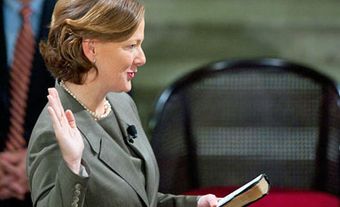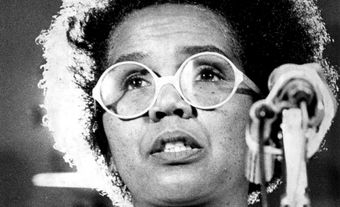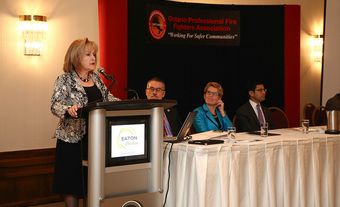
McLaughlin, Audrey
Audrey McLaughlin, née Brown, social worker, politician (b at Dutton, Ont 7 Nov 1936). McLaughlin earned a BA from the University of Western Ontario, studying by correspondence while she and her husband ran a mink farm north of London. She taught at a private college in Ghana, West Africa, from 1964 to 1967, and in 1967 enrolled in the University of Toronto School of Social Work, earning her MA and joining the Metropolitan Toronto Children's Aid Society as a social worker. By 1975 she had also been named executive director of the Canadian Mental Health Association. She moved to Whitehorse in 1979, where she worked as a business consultant and supervisor of social services.
McLaughlin entered the House of Commons in a by-election in 1987, the first New Democratic Party MP ever elected in the Yukon. She distinguished herself from her caucus colleagues by voting against ratification of the Meech Lake Accord (see Meech Lake Accord: Document), which she believed to be injurious to the interests of women and northern aboriginal people. After the 1988 election, she was named caucus chair, and on 2 December 1989 she was chosen leader of the NDP at a national convention in Winnipeg, succeeding Edward Broadbent. McLaughlin took her party more toward the economic centre while maintaining many traditional NDP policies such as higher taxes on the rich, extensive child-care programs and stimulation of the economy through government spending. She was the first woman to lead a national Canadian political party.
In the 1993 federal election, McLaughlin saw her party's support among voters fall to less than 6.9% of the popular vote. The party lost all of its seats in Ontario and, by returning only 9 members, lost its official party status in Parliament. McLaughlin retained her own seat in the Yukon. Although a significant responsibility for the party's electoral losses was attributed to McLaughlin's leadership, some observers wondered if the electorate and media had a propensity to be harsher on female leaders. Certainly, the federal NDP was hampered by its association with unpopular provincial NDP governments, especially in Ontario. The rise of new regional protest parties such as the populist Reform Party (now Canadian Alliance) in the West and the sovereignist Bloc Québecois in Quebec contributed significantly to the decline in the NDP vote in these parts of the country. Following the electoral setback, the NDP embarked on a series of renewal conferences to discuss the future of social democracy and the NDP. In addition, McLaughlin announced in 1994 that she would step down as party leader whenever a leadership convention could be held. She was succeeded by Alexa McDonough in October 1995. She published her autobiography, A Woman's Place, in 1992. In 1996, she was elected president of Socialist International Women.

 Share on Facebook
Share on Facebook Share on X
Share on X Share by Email
Share by Email Share on Google Classroom
Share on Google Classroom


